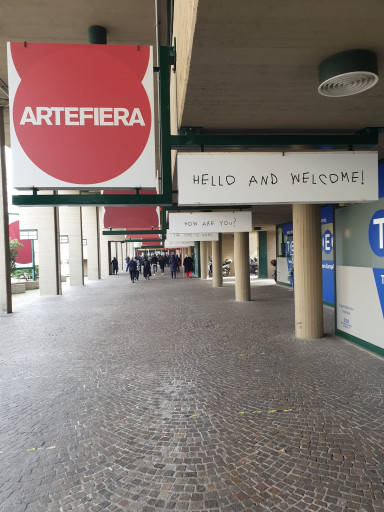

Stefan Kobel
,
Kobel's Art Weekly 6 2023
The spark of the Spark Art Fair in Vienna quickly fizzled out, the third edition was cancelled. Nicole Scheyerer reports for the FAZ: "Already towards the end of last summer it leaked out that the fair's director Renger van den Heuvel would be taking his hat off. His departure in October caused a frown, after all, the Dutchman, born in 1963, had only launched the Spark Art Fair in 2021. Previously, van den Heuvel had navigated the Viennacontemporary fair through the difficult waters of the Viennese gallery scene from 2012 onwards. It was not uncommon for their players to fight their skirmishes on the backs of the local art fairs, creating pressure with threatened or real cancellations and badmouthing the organisers." Christiane Meixner describes the consequences in the Tagesspiegel of 4 February: "What happened next is naturally seen differently by all those involved. The fact is that van den Heuvel's departure meant the loss of an experienced contact with an excellent network in the gallery scene. He was replaced by a managing director from outside the sector and a board that was supposed to be curatorial. In conversations with former participants, however, it seems that Herwig Ursin, as the operator of the Marx-Halle and the Spark, finally wanted to earn more with the fair. [...] Those who were not prepared to do so were to be replaced by other galleries. The consequence was fatal: numerous important gallery owners jumped ship. Even if they could have paid the rents. Resentment and defiance finally weighed heavier." For the Handelsblatt I try to put the cancellation into context.
I was probably the only foreign journalist to visit the Artefiera in Bologna for Artmagazine and WELTKUNST.
The Brussels Brafa is suffering from the tightened conditions for the trade in antiquities, Olga Grimm-Weissert wrote for the Handelsblatt: "The archaeology and antiquities dealers have now decided not to exhibit at the Brafa, as they feel unfairly suspected of being potential fences and money launderers. Their absence means a loss to the richness of variety at the fair, whose speciality is to offer some 20 market segments in a varied parcours."
A video had been censored at Art SG, Reena Devi of Artnews has learned: "According to BANK, the Shanghai-based gallery representing the artist at ART SG, they had been informed via the fair that Infocomm Media Development Authority (IMDA), the government statutory board involved in licensing arts and entertainment in the city-state, found some parts of the visuals in Electromagnetic Brainology! Concerning." Perhaps Singapore is not recommending itself as an alternative location for Hong Kong or Mainland China after all.
Once again on record course at Artcurial in Paris is the artwork for the cover of a Tintin album, about which Andreas Platthaus writes in the FAZ of 4 February: "As part of a Hergé focus in the auction on 10 February, it is flanked by two preliminary drawings for individual comic pages from 'Kohle an Bord' (1956) and 'Flug 714 nach Sydney' (1966). [...] In total, the Hergé offering comprises more than a hundred lots: from drawings for publications or marketing to lithographs, sculptural objects, enamel plates and rare book editions. Considering how much fuss has been made in recent years about the album 'Tintin in the Congo', which was condemned as racist, one may be surprised that 'Tintin in America' has not yet been talked about in a big way. But that should only be a matter of time".
In the USA, the big auction houses have once again become the focus of the investigating authorities, Ava Benny-Morrison has learned for Bloomberg: "The US crackdown on trade-sanction violators is turning to the art world as authorities track down works bought or sold by ultra-rich Russian tycoons. Through a series of subpoenas, federal prosecutors in New York are demanding high-end auction houses in the US turn over years of records as they seek to determine if art was smuggled offshore or if proceeds from sales were transferred illegally, according to a person familiar with the investigation."
In a slightly different vein, Ryah Pryor reports in The Art Newspaper: "A sale in France of more than 40 items from the Indian city Chandigarh has been postponed amid reports of an ongoing police investigation. The auction was due to take place at Osenat auction house, in Hotel Des Ventes du Château in Versailles, on 29 January. A spokesperson for the auction house confirmed that the sale 'is suspended and postponed, so it is not cancelled', but they were unable to provide further details. Items on offer include furniture designed by Le Corbusier and his cousin Pierre Jeanneret". Someone may now be faced with the difficult decision of admitting that either the furniture or the export papers were forged.
Residents of luxury all-glass flats next to the Tate Modern have won a victory in their legal battle, reports dpa: They "went to the Supreme Court, which upheld their case on Wednesday: any normal person would 'feel like they were in a zoo' in these circumstances," Judge George Leggatt said, according to the British news agency PA. He added that the flats in question were under constant surveillance every day. It was also not a compulsory part of the Tate Modern's museum business to allow visitors to look outside from the platform." However, the museum got there first.
Marc Spiegler gives the first in-depth interview since his departure from Art Basel to Artnet's Tim Schneider. Unfortunately, it is only available as a lengthy audio and is over an hour long.
semi-automatically translated